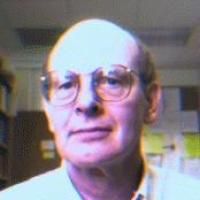Richard E. Hodel, Associate Professor Emeritus
 Professor Hodel is currently working on a number of projects.
LOGIC, TOPOLOGY, MATROID THEORY: WHAT DO THEY HAVE IN COMMON? A quick answer: fundamental concepts in each of these branches of mathematics can be described in terms of a closure operator that satisfies certain axioms. These ideas are due to Tarski, Kuratowski, and Whitney respectively. We take a somewhat different approach and use the closely related notion of a nearness relation. This gives a somewhat more geometric approach to the ideas under discussion; numerous applications of this approach are obtained.
A THEORY OF CONVERGENCE BASED ON KAPPA-NETS. This theory is very similar to convergence based on nets, but the directed set in question is always the collection of all finite subsets of some infinite cardinal kappa. This restriction allows one to take advantage of the eligence of the filter approach while retaining the intuitive advantage of nets. An immdediate application: a simplified cryptomorphic description of a topology in terms of convergence. This theory also yields characterizations of various covering properties (for example, Lindelof spaces) in terms of "generalized" kappa nets that have cluster points.
INTRODUCTION TO MATHEMATRICAL LOGIC I am currently working on a second edition of my logic book. - Contact Info:
| Office Location: | 019 Physics Bldg, Durham, NC 27708 | | Email Address: |   | Typical Courses Taught:
- Education:
| Ph.D. | Duke University | 1962 |
| B.S. | Davidson College | 1959 |
- Specialties:
-
Topology
- Research Interests: Set-theoretic Topology, set theory, logic
Professor Hodel is currently working on a number of projects.
LOGIC, TOPOLOGY, MATROID THEORY: WHAT DO THEY HAVE IN COMMON? A quick answer: fundamental concepts in each of these branches of mathematics can be described in terms of a closure operator that satisfies certain axioms. These ideas are due to Tarski, Kuratowski, and Whitney respectively. We take a somewhat different approach and use the closely related notion of a nearness relation. This gives a somewhat more geometric approach to the ideas under discussion; numerous applications of this approach are obtained.
A THEORY OF CONVERGENCE BASED ON KAPPA-NETS. This theory is very similar to convergence based on nets, but the directed set in question is always the collection of all finite subsets of some infinite cardinal kappa. This restriction allows one to take advantage of the eligence of the filter approach while retaining the intuitive advantage of nets. An immdediate application: a simplified cryptomorphic description of a topology in terms of convergence. This theory also yields characterizations of various covering properties (for example, Lindelof spaces) in terms of "generalized" kappa nets that have cluster points.
INTRODUCTION TO MATHEMATRICAL LOGIC I am currently working on a second edition of my logic book.
- Keywords:
- Weight
- Duties:
- MAT Advisory Committee
- Curriculum Vitae
- Current Ph.D. Students
(Former Students)
- Representative Publications
(More Publications)
- R.E. Hodel, Arhangel skii's Solution to Alexandroff's Problem: A Survey,
Topology and Its Applications 153, 2199-2217
(Submitted, 2006) [pdf]
- R.E. Hodel, Restricted versions of the Tukey-Teichmuller Theorem that are equivalent to the Boolean prime ideal theorem,
Archive for Mathematical Logic 44, 459 - 472
(2005) [pdf]
- R.E. Hodel, Classical metrization theorems,
in Encyclopedia of General Topology, edited by Hart, Nagata, Vaughan
(Preprint, 2003),
pp. 239-241, Elsevier
- R.E. Hodel, Modern metrization theorems,
in Encyclopedia of General Topology, edited by Hart, Nagata, Vaughan
(Preprint, 2003),
pp. 242-246, Elsevier
- Hodel, RE; Vaughan, JE, Reflection theorems for cardinal functions,
Topology and Its Applications, vol. 100 no. 1
(January, 2000),
pp. 47-66, Elsevier BV, ISSN 0166-8641 [Gateway.cgi], [doi] [abs]
|



